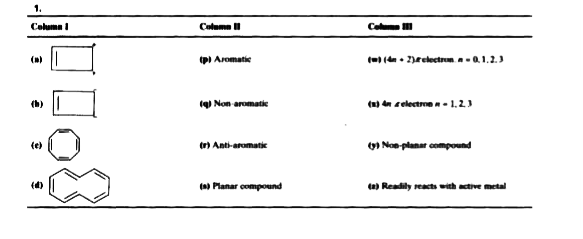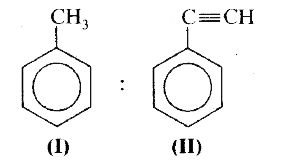We have now learned that benzene is unsually stable, and that this stability seems to be correlated with the overlap of its carbon 2p orbitals to form π molecular orbitals. In 1931. Erich Huckel (1896 - 1980), a German chemist physicist, elucidated with molecular orbital arguments the criteria for this sort of stability, which has come to be called aromaticity.
Criteria for aromaticity :
* Aromatic compounds contain one or more rings that have a cyclic arragement of p-orbitals. Thus, aromaticity is a property of certain cyclic compounds.
* Every atom of an aromatic ring has a p-orbital.
* Aromatic rings are planar.
The cyclic arrangements of p-orbitals in an aromatic compound must contain 4n+2π electrons, where n is any positive integer (0, 1, 2, ....). In other words, an aromatic ring must contain 2, 6, 10 π electrons.
Which of the following compound is not anti-aromatic ?




The correct Answer is:C
Topper's Solved these Questions
- AROMATIC COMPOUNDSBOOK - MS CHOUHANCHAPTER - AROMATIC COMPOUNDSEXERCISE - Additional Objective Questions (Integer Type)
2 Videos
- AROMATIC COMPOUNDSBOOK - MS CHOUHANCHAPTER - AROMATIC COMPOUNDSEXERCISE - Additional Objective Questions (Matrix Match Type)
2 Videos
- AROMATIC COMPOUNDSBOOK - MS CHOUHANCHAPTER - AROMATIC COMPOUNDSEXERCISE - Additional Objective Questions (Single Correct Choice Type)
20 Videos
- AN INTRODUCTION TO ORGANIC REACTIONS AND THEIR MECHANISMS ACIDS AND BASESBOOK - MS CHOUHANCHAPTER - AN INTRODUCTION TO ORGANIC REACTIONS AND THEIR MECHANISMS ACIDS AND BASESEXERCISE - ADDITIONAL QUESTION (SINGLE CORRECT CHOICE TYPE )
32 Videos
- BIOMOLECULESBOOK - MS CHOUHANCHAPTER - BIOMOLECULESEXERCISE - Level 2
1 Videos
Similar Questions
How many π electrons are present in C2H5 ?
View Solution
View SolutionWhich of the following compounds is likely to adopt a planar conformation ?
View Solution
In compound (I) and (II) inductive effect of phenyl is
View SolutionHow many compound which is given below is isomer of D-Glucose ?
D-Mannose, D-Fructose, D-Gulose, D-Idose, D-Galactose, D-Arabinose, D-Ribose.
View SolutionIf z-axis is the molecular axis, then π−molecular orbitals are formation by the formed by the overlap of
View SolutionOn the basis of molecular orbital treatment of various aromatic compound, it has been observed that an aromatic compound must fulfil the following theoritical requirements It must have an uninterrupted cyclic cloud of pi -electrons above and below the plane of the molecule (often called as pi -cloud). Let us look what does this mean? (i). for the pi -cloud to be cyclic, the molecule must be cyclic. (ii). For the pi -cloud to be uninterrupted, every atom int he ring must have a p-orbital iii). for the pi -cloud to be fomred, each p-orbital must be able to overlap with the p-orbitals on either side of it. therefore, the molecule must be planar. Q. The stability order of the three compounds
View SolutionIf x-axis is the molecular axis, the π-molecular orbitals are formed by the overlap of
View SolutionMolecular orbitals are formed by the overlap of atomic orbitals . Two atomic orbitals combine to form two molecular orbitals, called Bonding Molecular Orbital (BMO) and Anti - Bonding Molecular Orbital (ABMO). Different atomic orbitals of one atom combine with those atomic orbitals of the second atom which have comparable energles and proper orientation Further, if overlapping is head on, the molecular orbitals is called 'sigma' and if the overlap is lateral, the molecular orbital is called 'pi' . The molecular orbitals are filled with electrons following the same rules as followed for filling of atomic orbitals . However, the order of filling in not the same for of the most important parameter to compare a number of their characteristics Whihc one of the following statements is corrects ?
View SolutionMolecular orbitals are formed by the overlap of atomic orbitals . Two atomic orbitals combine to form two molecular orbitals, called Bonding Molecular Orbital (BMO) and Anti - Bonding Molecular Orbital (ABMO). Different atomic orbitals of one atom combine with those atomic orbitals of the second atom which have comparable energles and proper orientation Further, if overlapping is head on, the molecular orbitals is called 'sigma' and if the overlap is lateral, the molecular orbital is called 'pi' . The molecular orbitals are filled with electrons following the same rules as followed for filling of atomic orbitals . However, the order of filling in not the same for of the most important parameter to compare a number of their characteristics Which one of the following has maximum number of nodal planes ?
View SolutionMolecular orbitals are formed by the overlap of atomic orbitals . Two atomic orbitals combine to form two molecular orbitals, called Bonding Molecular Orbital (BMO) and Anti - Bonding Molecular Orbital (ABMO). Different atomic orbitals of one atom combine with those atomic orbitals of the second atom which have comparable energles and proper orientation Further, if overlapping is head on, the molecular orbitals is called 'sigma' and if the overlap is lateral, the molecular orbital is called 'pi' . The molecular orbitals are filled with electrons following the same rules as followed for filling of atomic orbitals . However, the order of filling in not the same for of the most important parameter to compare a number of their characteristics In whihc of the following pair the moelcular orbitals are gerade or ungerade ?
View Solution
यदि x-अक्ष आण्विक अक्ष है, तो -आण्विक कक्षकों का निर्माण किसके अतिव्यापन द्वारा होता है
View SolutionBenzene is an aromatic compound and has a ring structure. Its molecular formula is
View SolutionA π-molecular orbital is formed by the ............ overlapping of atomic orbitals.
View SolutionWe have now learned that benzene is unsually stable, and that this stability seems to be correlated with the overlap of its carbon 2p orbitals to form π molecular orbitals. In 1931. Erich Huckel (1896 - 1980), a German chemist physicist, elucidated with molecular orbital arguments the criteria for this sort of stability, which has come to be called aromaticity.
Criteria for aromaticity :
* Aromatic compounds contain one or more rings that have a cyclic arragement of p-orbitals. Thus, aromaticity is a property of certain cyclic compounds.
* Every atom of an aromatic ring has a p-orbital.
* Aromatic rings are planar.
The cyclic arrangements of p-orbitals in an aromatic compound must contain 4n+2π electrons, where n is any positive integer (0, 1, 2, ....). In other words, an aromatic ring must contain 2, 6, 10 π electrons.
Which of the following compound is not anti-aromatic ?
View Solution
